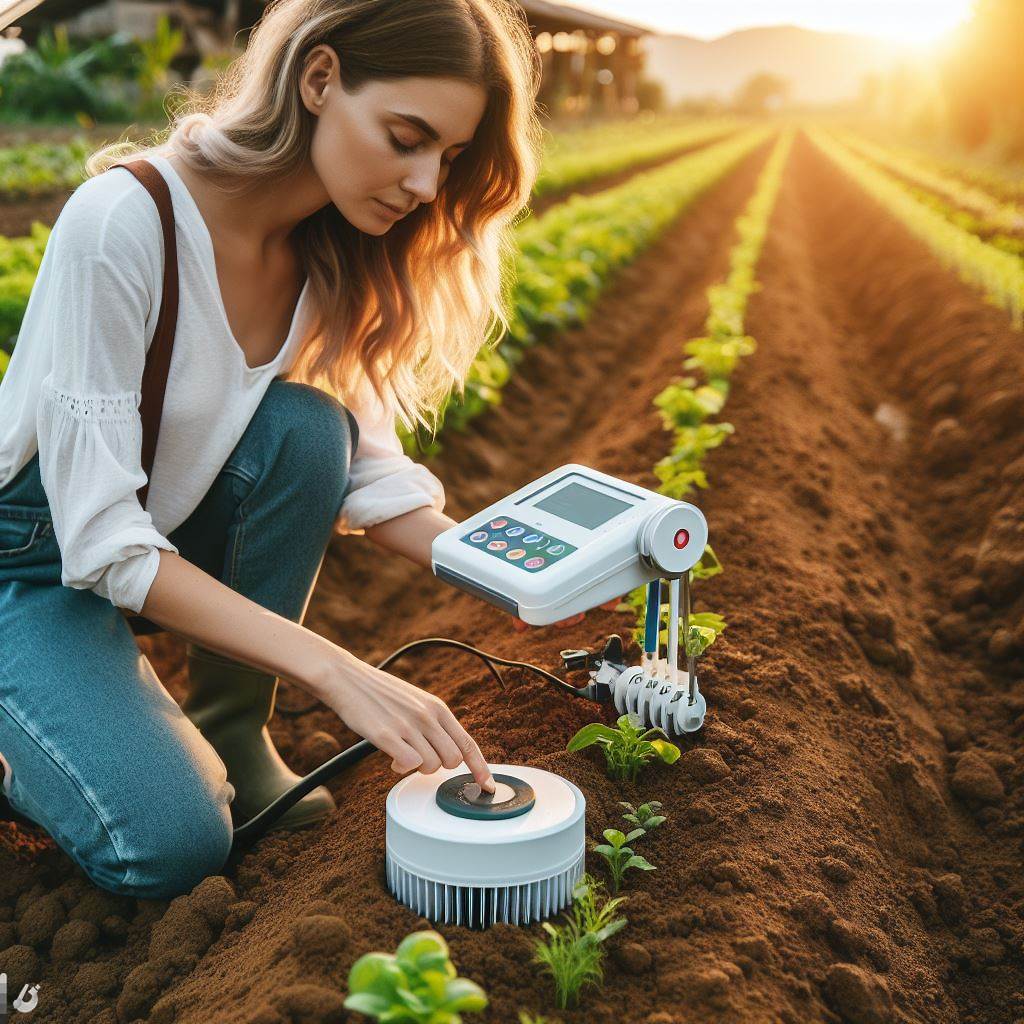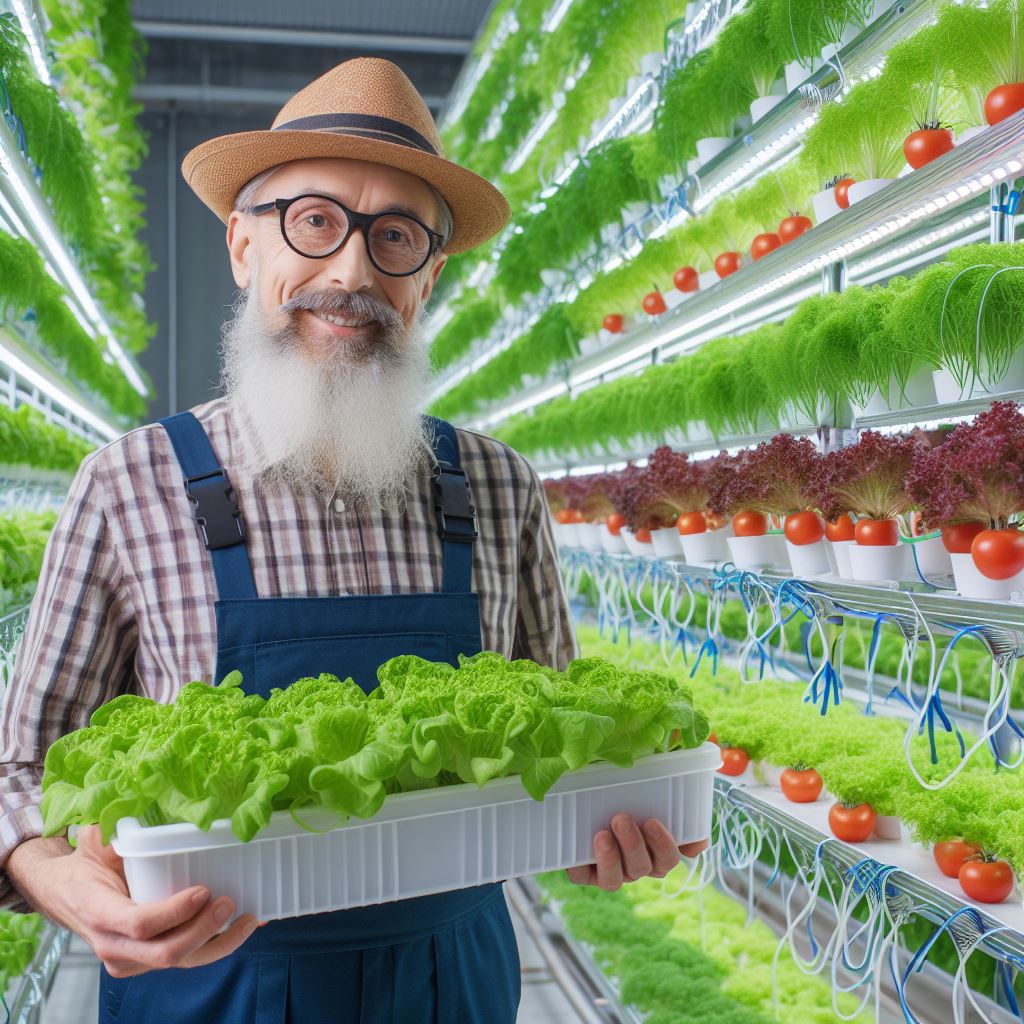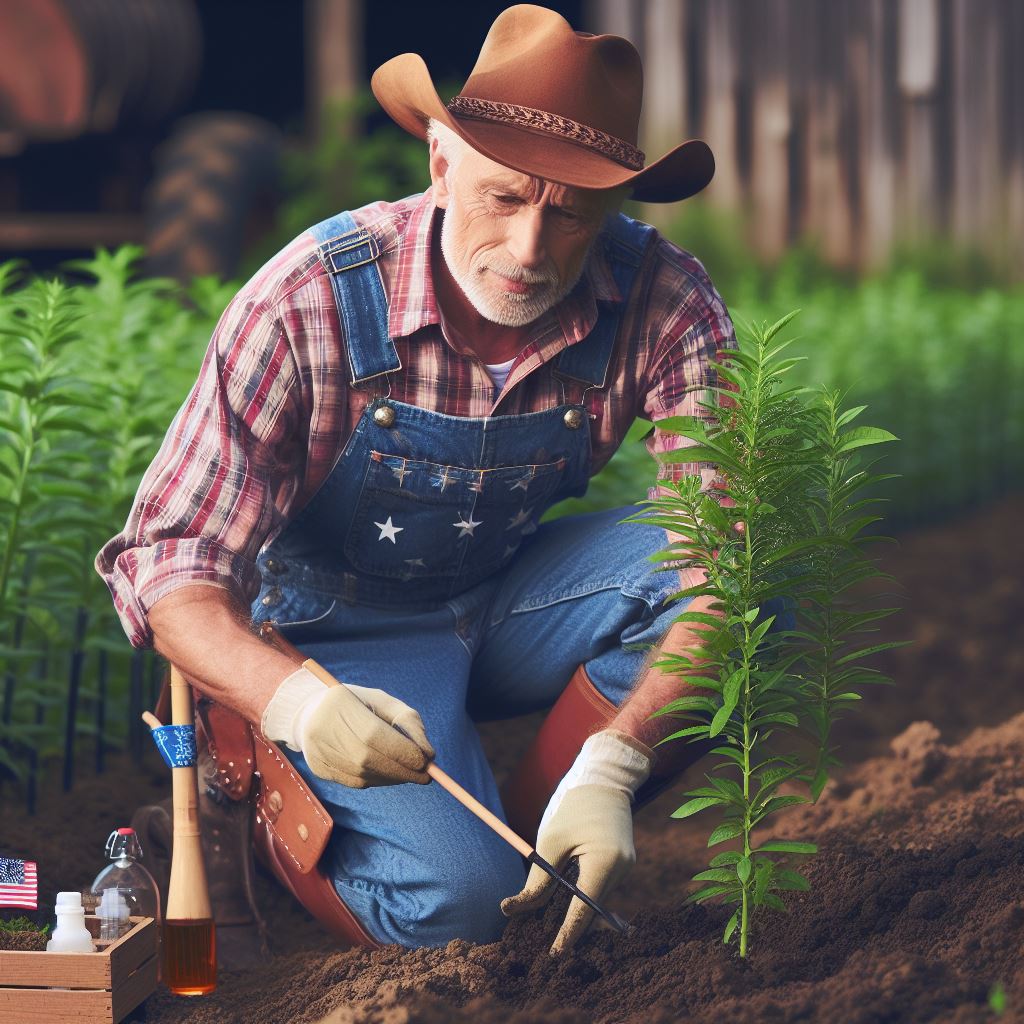Introduction
Implementing Soil Health Tech in sustainable farms is essential for fostering optimal plant growth and minimizing environmental impact, emphasizing the critical role of maintaining healthy soil in sustainable farming practices.
Technology plays a vital role in improving soil health by providing innovative solutions and tools.
In this blog post, we will explore the importance of soil health in sustainable farming, discuss the role of technology in enhancing soil health, and provide an overview of the topics covered.
Importance of soil health in sustainable farming practices
Healthy soil is the foundation of successful and sustainable farming.
It provides essential nutrients and minerals to plants, improves water infiltration, and enhances natural resistance to pests and diseases.
By focusing on soil health, farmers can increase crop yields and reduce the need for synthetic fertilizers and pesticides, resulting in a more environmentally friendly and cost-effective approach to agriculture.
Role of technology in improving soil health
Technology offers various tools and techniques to enhance soil health.
Soil sensors and monitoring systems help farmers gather vital data, such as moisture levels and nutrient content, enabling them to make informed decisions about irrigation and fertilization.
Precision agriculture techniques, such as GPS-guided machinery and variable rate application, allow farmers to apply inputs precisely where needed, minimizing waste and optimizing soil fertility.
Furthermore, innovative solutions like cover cropping and conservation tillage can be implemented through technological advancements, preserving soil structure and minimizing erosion.
Brief overview of the blog post
Throughout this blog post, we will delve deeper into the importance of soil health in sustainable farming practices.
We will explore the benefits of healthy soil, the challenges faced by farmers, and the potential solutions offered by technology.
By understanding and utilizing these advancements, we can ensure the long-term sustainability and productivity of our agricultural systems.
Together, let’s embrace soil health as a key component of sustainable farming practices.
Definition and importance of soil health
Definition and components of soil health
- Soil health refers to the ability of soil to sustain plant growth and maintain ecosystem functions.
- It encompasses the physical, chemical, and biological properties and processes of soil.
- Key components of soil health include soil structure, organic matter content, nutrient availability, and soil biodiversity.
Significance of soil health for sustainable agriculture
- Soil health is vital for sustainable agriculture as it promotes long-term productivity and stability.
- Healthy soil improves water infiltration, reducing erosion and enhancing water holding capacity.
- It enhances nutrient cycling, minimizing the need for synthetic fertilizers and reducing nutrient runoff.
- Healthy soils support beneficial soil organisms, such as earthworms and beneficial microbes, which aid in natural pest control.
- It plays a crucial role in carbon sequestration, helping mitigate climate change by storing carbon in the soil.
Impact of healthy soil on crop yield and environmental sustainability
- Healthy soil leads to increased crop yield and quality.
- Proper soil management practices, such as crop rotation and cover cropping, improve soil health and enhance crop productivity.
- Improved soil health reduces the incidence of crop diseases and increases plant resilience to environmental stress.
- Sustainable agriculture practices that prioritize soil health help preserve natural resources and protect the environment.
- Healthy soil promotes biodiversity, supporting a diverse range of plant and animal species, thus contributing to overall ecological balance.
Generally, soil health is crucial for sustainable farms and agriculture.
Transform Your Agribusiness
Unlock your farm's potential with expert advice tailored to your needs. Get actionable steps that drive real results.
Get StartedIt encompasses various components and plays a significant role in crop yield and environmental sustainability.
By prioritizing soil health through proper management practices, farmers can ensure long-term productivity while minimizing negative impacts on the environment.
Investing in soil health technologies and promoting sustainable farming practices is essential for the future of agriculture and global food security.
Read: Permaculture Principles: Soil Health Focus
Current challenges in maintaining soil health
Soil erosion and degradation
Soil erosion is a major challenge that farmers face today.
It occurs when the top layer of soil gets washed away by heavy rains or blown away by strong winds.
This erosion leads to the loss of fertile soil, making it difficult for plants to grow.
Additionally, soil degradation is another issue that poses a threat to soil health.
This happens when the quality of the soil deteriorates due to various factors such as improper farming practices, excessive use of chemicals, and deforestation.
As a result, the soil’s ability to support plant growth is significantly reduced.
Loss of soil fertility
One of the primary challenges in maintaining soil health is the loss of soil fertility.
Fertile soil is rich in essential nutrients that promote plant growth.
However, due to intensive farming practices and inadequate soil management techniques, the fertility of the soil is decreasing.
The continuous cultivation of crops without proper nutrient replenishment leads to a depletion of vital nutrients in the soil.
Over time, this results in reduced crop yields and the need for additional fertilizers to compensate for the nutrient deficiency.
Need for effective soil management techniques
To address the challenges of soil erosion, degradation, and loss of fertility, it is crucial to implement effective soil management techniques.
Firstly, farmers can adopt conservation practices to prevent soil erosion.
This includes techniques such as contour plowing, terracing, and the use of cover crops.
These practices help in retaining moisture and preventing the loss of topsoil.
Secondly, implementing sustainable farming practices can help improve soil health and fertility.
Crop rotation, intercropping, and agroforestry are some techniques that promote biodiversity and enhance the nutrient content of the soil.
Furthermore, reducing the reliance on chemical fertilizers and pesticides can also contribute to better soil health.
Organic farming methods, such as composting and the use of natural fertilizers, help in enriching the soil with organic matter and beneficial microorganisms.
Additionally, using modern soil testing and monitoring technologies can provide farmers with valuable insights into the nutrient content and health of their soil.
Showcase Your Farming Business
Publish your professional farming services profile on our blog for a one-time fee of $200 and reach a dedicated audience of farmers and agribusiness owners.
Publish Your ProfileThis information enables them to make informed decisions regarding fertilization and other soil management practices.
In short, maintaining soil health is vital for sustainable farming practices.
Soil erosion, degradation, and loss of fertility are significant challenges that need to be addressed.
By adopting effective soil management techniques, farmers can mitigate these challenges and ensure the long-term sustainability of their farms.
It is our responsibility to protect and nurture our soil for a healthier and more productive future.
Read: Boosting Soil Health: Top Cover Cropping Tips
Role of technology in improving soil health
Soil health plays a pivotal role in ensuring the sustainability and productivity of farms.
With advancements in technology, farmers now have access to innovative tools and techniques that can significantly improve soil health and optimize agricultural practices.
Soil monitoring and analysis
One of the key ways technology aids in improving soil health is through soil monitoring and analysis.
Soil sensors have emerged as a valuable tool for farmers, providing real-time data on soil conditions such as moisture level, temperature, and nutrient content.
These sensors enable farmers to make informed decisions about irrigation and fertilizer applications, leading to efficient resource management and improved soil health.
Soil testing kits have also gained popularity as they allow farmers to conduct on-site analysis of soil nutrient content.
By knowing the precise nutrient levels, farmers can tailor their fertilizer applications and ensure optimal nutrient balance in the soil.
This not only improves crop yield but also minimizes nutrient runoff, reducing environmental impacts.
Furthermore, remote sensing technology, such as satellite imagery and aerial surveys, has revolutionized soil analysis.
These tools provide comprehensive data on soil properties, allowing farmers to identify areas with specific deficiencies or excesses.
With this information, farmers can implement targeted interventions, such as soil amendments or crop rotation, to rectify soil imbalances and enhance overall soil health.
Precision agriculture and soil management
Precision agriculture techniques have revolutionized soil management practices.
Drones and satellite imagery enable farmers to create accurate soil maps, identifying variations in soil properties across their fields.
This information helps farmers make precise decisions regarding irrigation, pesticide application, and other farming activities, leading to optimized resource utilization and improved soil health.
Variable rate technology (VRT) is another vital tool employed in precision agriculture.
VRT allows farmers to apply fertilizers or other inputs in varying amounts based on the specific needs of different areas within a field.
By tailoring fertilizer application to individual soil requirements, farmers maximize nutrient uptake by crops while minimizing waste and nutrient leaching, resulting in improved soil health and reduced environmental impacts.
The integration of GPS (Global Positioning System) and GIS (Geographic Information System) technologies further supports precision agriculture.
GPS allows farmers to precisely track their field operations, ensuring accurate implementation of farming practices.
GIS, on the other hand, enables farmers to overlay various layers of spatial data, facilitating better decision-making regarding soil management strategies and overall farm planning.
Soil conservation and erosion control
Technology has also been instrumental in promoting soil conservation and erosion control measures.
Implementation of cover crops and conservation tillage practices helps protect soil from erosion, improve its structure, and enhance moisture retention.
By preventing excessive soil erosion, these practices contribute to the long-term sustainability of agricultural land.
Erosion monitoring systems, including soil erosion sensors, provide real-time data on soil erosion rates and alert farmers to areas at risk.
By identifying erosion-prone areas, farmers can implement targeted erosion control practices, such as contour plowing or terracing, to prevent further soil loss and preserve soil health.
Biotechnological solutions, such as the use of soil stabilizing microbes, have also gained attention in soil conservation efforts.
These beneficial microbes help bind soil particles, improving soil structure and stability.
By enhancing soil stability, farmers can effectively combat erosion and promote healthy soil conditions for sustainable farming practices.
Essentially, technology plays a vital role in improving soil health on farms.
The use of soil monitoring tools, precision agriculture techniques, and soil conservation measures enables farmers to make informed decisions, optimize resource utilization, and promote sustainable farming practices.
By harnessing the power of technology, farmers can contribute to the long-term viability of their farms while reducing environmental impacts.
Read: Breakthroughs in Soil Health: Agri-Tech Role

Benefits and Impact of Soil Health Tech
Soil health tech promotes environmental sustainability by minimizing the negative impact of agriculture on ecosystems.
By optimizing resource usage, it reduces water pollution, soil erosion, and greenhouse gas emissions.
Showcase Your Farming Business
Publish your professional farming services profile on our blog for a one-time fee of $200 and reach a dedicated audience of farmers and agribusiness owners.
Publish Your ProfileThis contributes to climate change mitigation and overall environmental well-being.
Improved Crop Yield and Quality
- Real-time data on soil conditions allows for informed decisions on irrigation, fertilization, and pest control.
- Optimized crop growth through precise application of inputs leads to increased productivity.
- Soil health tech enhances crop quality by providing necessary nutrients and minimizing crop stress.
Resource Efficiency and Reduced Input Costs
- Monitoring soil moisture levels helps optimize irrigation practices, reducing water usage.
- Precision application of fertilizers and pesticides minimizes their wastage, saving costs.
- Smart farming techniques made possible by soil health tech reduce the need for excessive inputs.
Environmental Sustainability and Climate Change Mitigation
- Soil health tech minimizes water pollution by preventing leaching of excess nutrients.
- Precise application of inputs reduces soil erosion, protecting valuable topsoil.
- By optimizing resource usage, soil health tech helps reduce greenhouse gas emissions.
In general, the benefits and impact of soil health tech on sustainable farms are significant.
This innovative technology improves crop yield and quality, leading to increased productivity for farmers. It promotes resource efficiency by optimizing water and input usage, resulting in reduced costs.
Furthermore, soil health tech plays a crucial role in environmental sustainability and mitigating the effects of climate change by reducing pollution and preserving soil health.
Embracing soil health tech is a step towards a more sustainable and productive agricultural future.
Read: Soil Health: The Heart of Organic Farming
Case studies and success stories
Examples of farms adopting soil health tech
- Bruce Wood Family Farm in California implemented soil health tech to improve crop quality and yield.
- Nile City Farms in Iowa increased their profits by employing soil health monitoring devices.
- Jill Berry Farm in Texas reduced their water usage and improved soil moisture retention through soil health tech.
Positive outcomes and lessons learned
- By utilizing soil health tech, farms experienced reduced fertilizer and chemical usage, resulting in cost savings.
- Farmers learned that maintaining soil health leads to improved resilience against pests and diseases.
- Increased organic matter in the soil through tech adoption enhanced nutrient availability for plants.
Inspiration for other farmers to incorporate soil health tech
- The success stories of these farms serve as living examples of the benefits of soil health tech.
- Seeing the positive outcomes, farmers are inspired to explore and implement similar technologies on their farms.
- Soil health tech empowers farmers to make data-driven decisions, leading to sustainable and profitable farming.
In essence, case studies and success stories highlight the significance and advantages of adopting soil health tech on farms.
Farms such as Bruce Wood Family Farm, Nile City Farms, and Jill Berry Farm have witnessed increased crop quality, reduced costs, and improved sustainability through the application of soil health monitoring devices and practices.
The positive outcomes and lessons learned from these examples encourage other farmers to explore and incorporate soil health tech on their own farms.
By harnessing data and technology, farmers can achieve long-term soil health, enhanced productivity, and environmental sustainability.
Conclusion
Recap of the importance of soil health tech for sustainable farms
In this blog post, we have explored the significance of soil health technology in promoting sustainable farming practices.
We have learned that soil health plays a vital role in crop productivity, nutrient availability, and environmental sustainability.
By utilizing soil health tech, farmers can enhance soil fertility, minimize soil erosion, and reduce chemical inputs.
Call to action for farmers to embrace soil health technologies
It is crucial for farmers to embrace soil health technologies to ensure the long-term viability of their farms.
By incorporating practices such as cover cropping, conservation tillage, and precision nutrient management, farmers can improve soil health, increase crop yields, and reduce environmental impacts.
Investing in soil health tech is not only beneficial for farm profitability but also for creating a sustainable future in agriculture.
Future prospects and potential advancements in soil health tech
The field of soil health technology is constantly evolving, and several advancements are on the horizon.
Research is focused on developing innovative tools and techniques to better monitor soil health parameters and predict changes in soil conditions.
Furthermore, advancements in biological solutions, such as biofertilizers and microbial inoculants, hold promise in enhancing soil fertility and reducing reliance on synthetic inputs.
Closing thoughts and encouragement for readers to explore the topic further
In a nutshell, soil health tech has emerged as a key component of sustainable farming systems.
By adopting these technologies, farmers can improve soil quality, mitigate environmental risks, and secure their agricultural operations for future generations.
I encourage readers to dive deeper into the subject, explore the latest advancements, and implement soil health tech practices on their farms.
Together, we can build a resilient and sustainable agricultural future.




